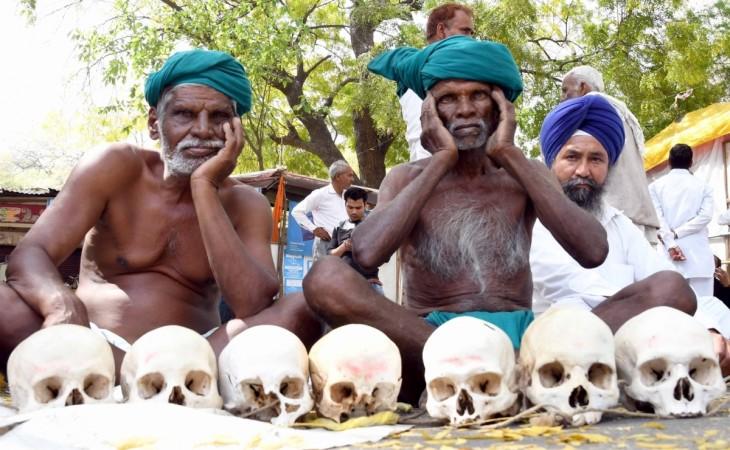
Uttar Pradesh's new chief minister Yogi Adityanath, who has created quite a buzz ever since his elevation to the top post, waived farm loans to the tune of a whopping Rs 36,000 crore.
This brought some much-needed relief to small and marginalised farmers of the state in his very first Cabinet meeting.
Through this, the chief minister scored a political brownie point, which will help the BJP in the next Lok Sabha election, scheduled two years from now.
Also read: Madras HC directs Tamil Nadu government to waive farmers' loans in cooperative banks
The waiver will certainly bleed the state's coffers and take a toll on the banking system, but in politics, economics is not always preferred. What's significant in this move is that the BJP has shown the people of UP, and elsewhere, that it is not afraid to take the most adventurous of measures when it comes to showing a 'pro-people' face.
After decades of divisive politics that the two regional parties – SP and BSP – played in the state to keep their respective vote-banks strong, the BJP has conveyed a message that it is for the people, not a particular community.
While UP farmers witness the arrival of Acche Din, their TN counterparts continue to struggle
But go down South to the state of Tamil Nadu and you will see a picture that reeks of contradiction.
The farmers of the state, which has been badly hit by a scarcity of water, have been staging bizarre protests in Jantar Mantar in New Delhi for nearly a month now to draw the Centre's attention to their plight.
They have carried with them skulls -- that they claim belong to their colleagues who committed suicide after failing to cope with the distress -- dead snakes and live rats that they say are their only sustenance in the wake of the drought, the worst in the last 140 years.
Though Tamil Nadu's new chief minister Edappadi Palaniswami sanctioned a drought relief package of Rs 2,247 crore for 32 lakh farmers in the state, the hapless peasants are still camped in the national Capital looking for a package of Rs 40,000 crore and better support price for their produce from the Centre. They also want loans waived.
How much will meetings and sympathies help the TN farmers?
Various leaders, including Congress vice-president Rahul Gandhi and Deputy Speaker of the Lok Sabha, M Thambidurai, met the protesting farmers at Jantar Mantar, but one doubts how much relief these meetings will bring to the farmers.
Comparing the relief that the farmers in Adityanath's UP got, one cannot help but ask the question: Is the political vacuum in Tamil Nadu responsible for the endless agony of its own farmers?
TN in a mess after Jayalalithaa's death
After the death of J Jayalalithaa, the towering leader of Tamil Nadu, the state's politics has been in complete chaos with two factions in the ruling AIADMK wrestling each other for power.
The two camps, led by O Panneerselvam and Sasikala Natarajan, respectively, have been desperate to prove who the real holder of the late leader's legacy is, and in the ugly spat that has ensued, there has been little concern for the hapless farmers.
The AIADMK government declared Tamil Nadu as a drought-hit state in January, but amid the chaos over the Jallikattu ban, and the constitutional pandemonium over choosing the next chief minister, the issue of waiving farmers' loans was pushed to the backburner.
Jayalalithaa also walked the same path as Adityanath last year
But Tamil Nadu was going the UP way less than a year ago when Jayalalithaa, who won a second successive election for the first time in May 2016, passed a slew of orders including waiving the loans of small and cooperative farmers.
That, besides other populist measures like free electricity, partial closure of liquor shops, etc, was part of her party's pre-poll promises made prior to the Assembly elections.
The waiving of cooperative crop loans, medium-term and long-term loans of small farmers payable as of March 31, 2016, was set to cost the state exchequer Rs5,780 crore, the government had said. Still, a far lower figure than that in Adityanath's UP.
Moreover, though the farmers welcomed the move by the Jayalalithaa government, the loans taken by them through cooperative banks constituted only 22 percent of the total loans, as the remaining ones lay with government banks.
That is a disadvantage for farmers, as when nationalised banks are asked to clear their non-performing assets, they come after those who work the land.
Madras HC has stepped in, but will that eventually help the farmers?
It is for this reason that not all were convinced after the Madras High Court asked the Tamil Nadu government to waive all farmer' loans taken from cooperative banks and sought that loans taken from nationalised banks also be pardoned.
Adityanath's super-populist measure of waiving loans worth Rs36,000 crore will make economists suspicious of its viability, but for the farmers from Tamil Nadu, the situation is even worse.
They do not have a leader to fight for their rights and make the Centre grant concessions. Those fighting for Jayalalithaa's legacy are too petty to bear such an immense responsibility on their weak shoulders.
For Prime Minister Narendra Modi and the BJP, this is a chance to make inroads into the psyche of Tamil Nadu's farming community by emerging as their saviour, but it's unlikely even a political move like that will help Tamil Nadu's farmers.









